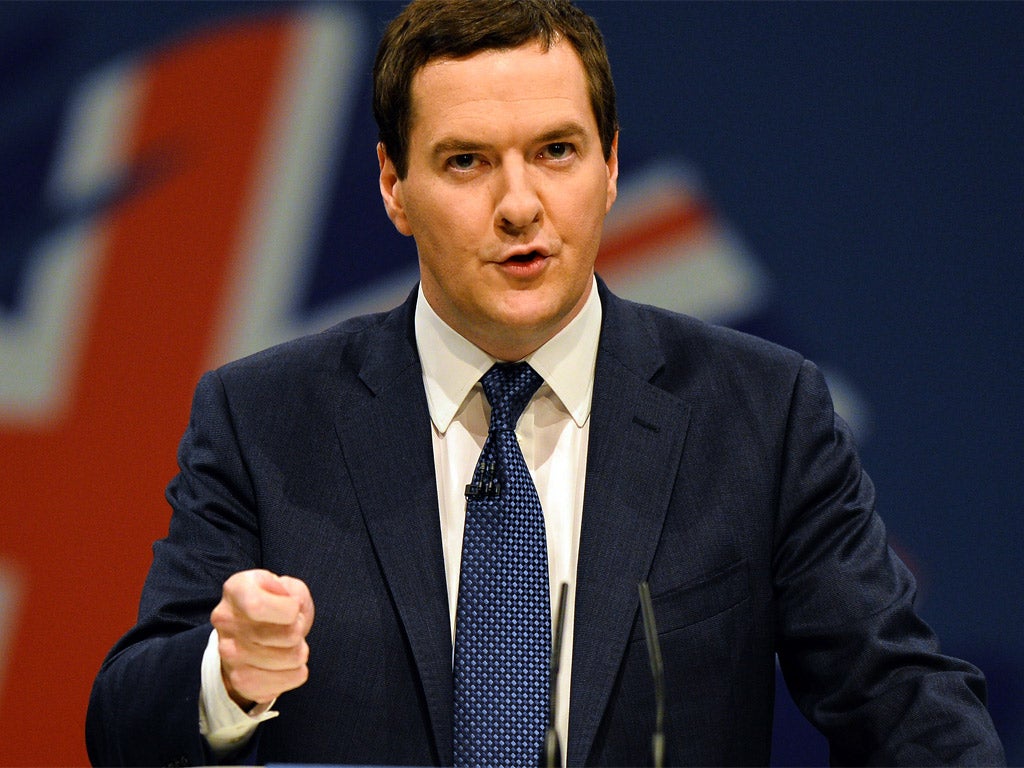Voters prefer growth to higher wages: Poll suggests Conservatives have won the argument over the economy
The competing visions of the two main parties will be a crucial battleground at the 2015 election

Britons regard securing growth as their top economic priority and believe it is more important than higher wages, according to survey for The Independent.
The ComRes findings suggest that the Conservatives’ message on the economy may resonate more than Labour’s campaign on the “ cost-of-living crisis”. Their competing visions will be a crucial battleground at the 2015 election.
The public were asked to choose their most important priority over the next five years from a range of options about the economy. The most popular was ensuring that it continues to grow (41 per cent) followed by ensuring wages rise faster than prices (25 per cent); keeping inflation down (17 per cent); reducing the deficit (12 per cent); other (3 per cent) and don’t know (2 per cent).
Now that the economy is growing, the Tories will take heart from the finding that people view growth as the most important economic priority. Labour has criticised David Cameron for allowing prices to rise faster than wages in 40 of his 41 months as prime minister. Ed Miliband, who has made living standards his main campaign theme, has promised to raise the national minimum wage and bring in incentives to firms to pay the higher “living wage”. But the poll suggests the public are more concerned about the general state of the economy.
However, there is hope for Labour in the finding that people regard the deficit as less important than they did when the Coalition was formed. George Osborne has repeatedly insisted that the task of clearing the deficit is not completed and wants the Tories to campaign in 2015 as the party to “finish the job”. In contrast, Mr Miliband wants Labour to borrow more than the Coalition to fund house-building and infrastructure projects.
Younger people are more likely than older ones to place more importance on wages rising faster than prices. Some 33 per cent of 18-34 year-olds say this should be the top priority, compared to only 18 per cent of those aged 55 and over.
A quarter of people aged 55 and over (26 per cent) regard keeping inflation down as the top priority. The findings suggests that higher wages may have little appeal to older people who no longer receive a salary. People aged 65 and over are more likely to say they would vote Conservative (38 per cent) than Labour (31 per cent). Current Tory supporters (52 per cent) are more likely than Labour voters (40 per cent) to prioritise growth, and more likely to name reducing the deficit (20 per cent) than Labour supporters (4 per cent).
In contrast, Labour voters (32 per cent) are more likely than that Tory supporters (13 per cent) to believe that ensuring wages rise faster than prices is the No 1 issue. That suggests that Mr Miliband’s message plays better amongst his party’s natural supporters than other voters.
According to ComRes, Labour retains the five-point lead it enjoyed in its last telephone poll for The Independent in November. Labour is on 37 per cent (no change); the Conservatives 32 per cent (no change); the UK Independence Party 10 per cent (down one point), the Liberal Democrats 9 per cent (no change) and others 12 per cent (up one point). These figures would give Labour an overall majority of 60 at a general election.
ComRes interviewed 1,003 adults by telephone between November 13-15. Data was weighted to be demographically representative of all GB adults. Data was also weighted by past vote recall. ComRes is a member of the British Polling Council and abides by its rules
Video: Councils funding 'fair'
Subscribe to Independent Premium to bookmark this article
Want to bookmark your favourite articles and stories to read or reference later? Start your Independent Premium subscription today.

Join our commenting forum
Join thought-provoking conversations, follow other Independent readers and see their replies